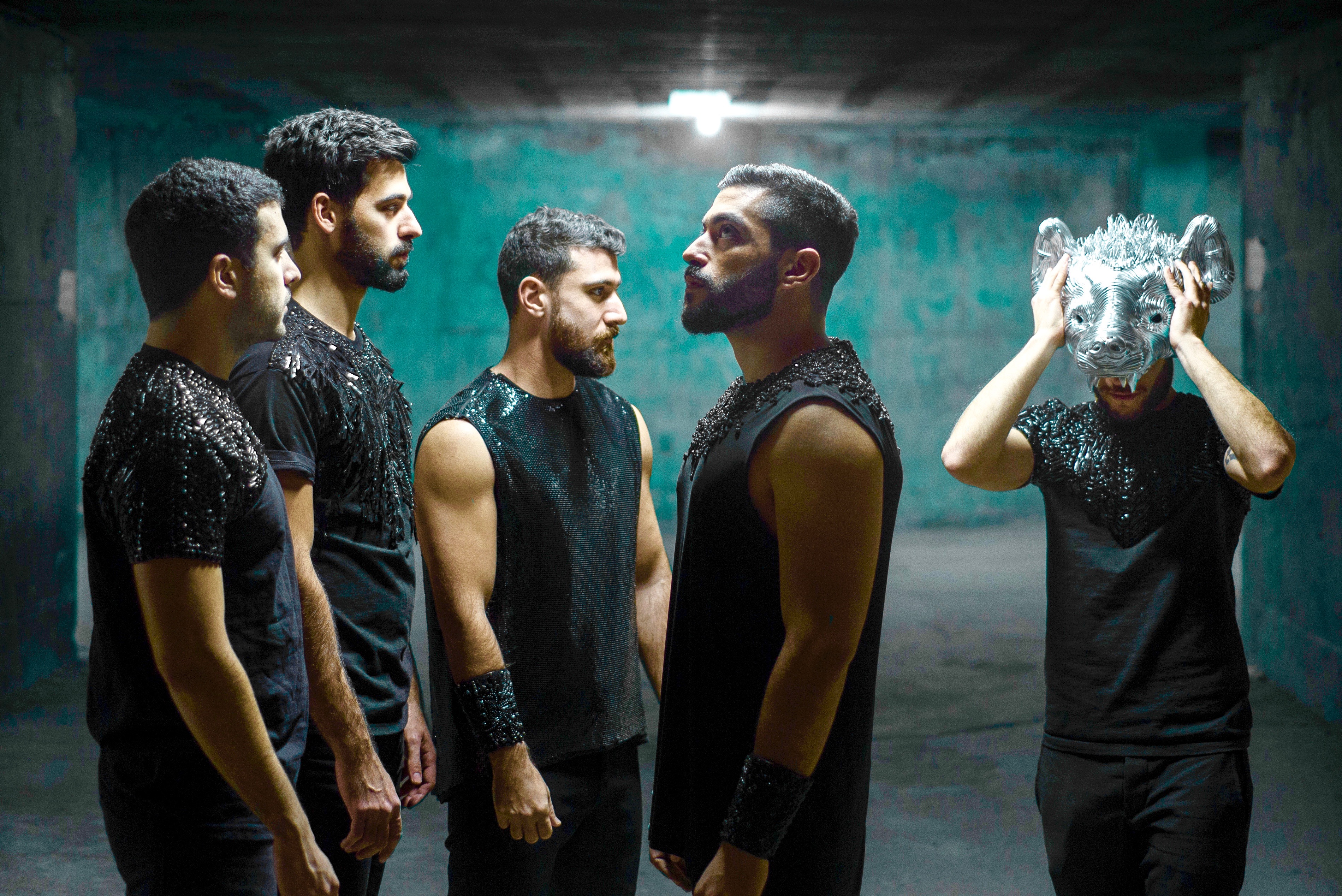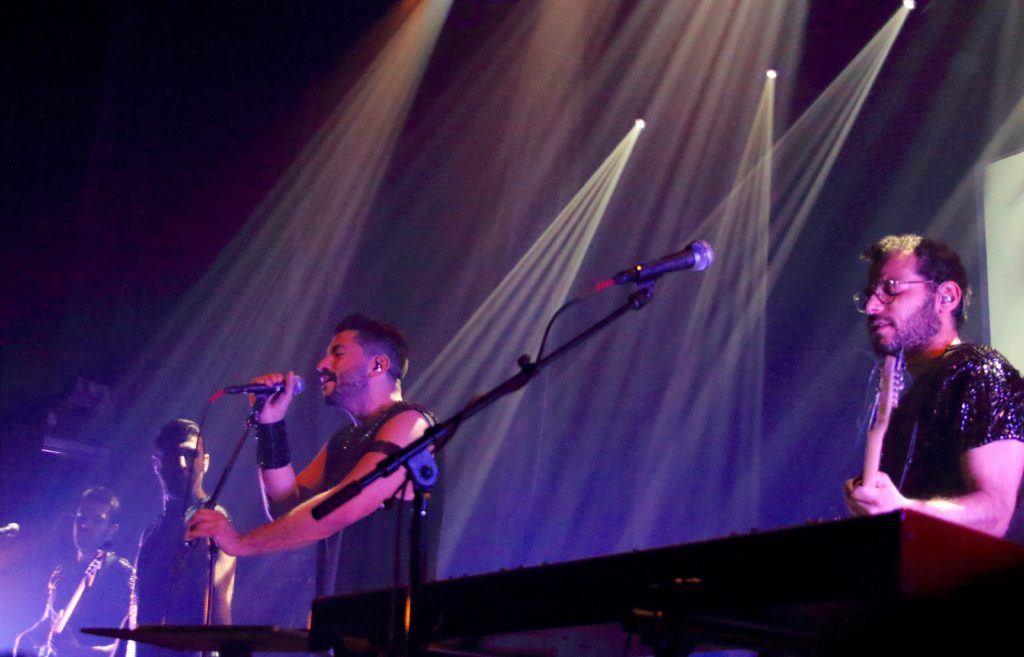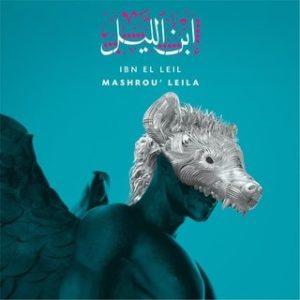Eight years ago, a group of architectural students at the American University in Beirut, Lebanon, came to a collective decision that they could express themselves better through music than architecture—and with that, Mashrou' Leila was born. Since then, the band has distinguished itself, not just at home but worldwide, with alternative rock music sung in Arabic, and bringing in their multidisciplinary arts background into their songwriting, record production and live shows.
In addition to trying to forge a different kind of homegrown music atypical in the Middle East, the band has become known for the political and religious freedom messages in their music. Those messages have often dealt with issues of gender identity as two band members are openly gay—in a country, which they've noted, is dominated by both homophobic Muslims and homophobic Christians. In April of this year, the group was “unofficially” banned from playing a concert in Amman, Jordan. But within days, international attention to the ban had the government reverse their stance, though it was too late for the concert to go on.
We had a chance to catch up with a few members of the band—violinist Haig Papazian, drummer Carl Gerges, and bass player Ibrahim Badr—before their show at Club Soda in Montreal during the Festival International de Jazz where they were showcasing their new album Ibn El Leil.
Ron Deutsch: Let's start here. Your band's name loosely translates to “night project,” but I've read how you've often made up stories of its history and meaning. Care to make up one for us?
Carl Gerges: Ah, that's just something we started to do because we got really bored.
Haig Papazian: There's very little real music journalism in the Middle East, so usually they ask the same really stupid questions and at some point we decided that we'd actually play this game to make up stories to make people believe this is what the story is.
There are so many stories—like it's named after a woman who bakes Lebanese pizzas across the street who wanted breast implant surgery. Some of them are completely crazy and out there like that, but people believed it. But that's the funny part because a lot of these stories are referenced in other journals or articles as the main reason why we named the band.
This is your second tour of North America. How are you finding the audiences responding? Are they mostly Arabic speakers or are you seeing a lot of non-Arab fans now as well?
Haig: Usually people would expect for a Lebanese band it's going to be mostly Arabs or people who speak Arabic will be at the show. The really nice part is that most of the shows the crowd has been so mixed. In Los Angeles, Chicago, New York and D.C., we saw even on our previous tour that 60-70 percent of the people don't speak Arabic, and they're just there dancing.
Carl: Hamed [our lead singer] always has this question where he asks who speaks Arabic and then people raise their hands. And maybe only a small number raise their hands, but they scream so loud as if it's the whole crowd.
Is it an issue for you that many coming to see the band do not understand just your song lyrics, but often the musical references to traditional Middle Eastern music that underpins what you're trying to communicate?
Carl: Of course. Yes, it matters. The motive of playing live for us, is much more than just rocking out. There are a lot of layers to the performance that are important to us.
Haig: Hamed is trying to introduce each song, and to explain the lyrics and the idea behind each song. We think it's important for people who can't speak Arabic to understand what's happening in the song. The music, as well, portrays pretty well the mood and the color of what's happening. We also now have the visuals behind us which adds another layer to get into the mood.
Ibrahim Badr: Even the people who are not Arabic know what the band stands for and what our music is. We do like 40-50 percent of our shows in the Middle East, and then the rest in Europe and North America.
Carl: Especially knowing that a lot of the fans coming probably left the Middle East for a lot of the reasons we sing about, it's important to relate to those people, as well. You can't just ignore that and think just because we're in Canada or the U.S., or wherever. We don't try to shy away from it, or wishfully forget it being there. On the contrary, I think it's important make it obvious what's going on.
But it's also important to remember that it's a show, and that the music does account for a lot of the message in itself—the mood and the physical presence of the people on stage. It's such a powerful thing, and we're aware of that. And we try to improve our physicality, our theatricality and all these things on stage, all the time, as well.
Speaking of your stage show, how does your background in architecture play into that?
Ibrahim: It kind of feeds into the way that we think about music and writing the songs and lyrics. I feel like architecture has opened a lot of doors for us to grow and to think beyond regular structure of how things should be. I mean, that's what made us start the band and made us want to write music together. When you're in design school you always have all these creative ideas you end up putting them in architecture or graphic design, but then our focus changed and now we're just putting it in our music at this point. We think about everything from our album art to our videos to our performance on stage.
Carl: Architecture school in Lebanon follows the kind of holistic method. It's not a very North American thing. It's a very collaborative thing, going into every last details—the furniture, the colors of the walls. So that's what we do with our music. We go through the design of album, the posters, the visuals. We have creative control over pretty much the whole concept that goes beyond just the music. There's a whole kind of mythology to this album and how it's designed.
For example, how does this play out in the new album?
Carl: The whole mood of the album was really dark, night. Rather than being just 12 tracks on an album, we start by coming up with a story that could relate all the tracks together. We work on everything to the order of the songs to the name of the songs, which are very consciously chosen—the packaging, and even the tour and the identity of the tour.
Ibrahim: The way that the album is made, it's kind of a like an object you get. We don't like to think of our albums as something you buy and throw it in your CD player. It always comes with posters inside that you want to hang. When we were kids, when you bought an album it had all this stuff, but we don't have that kind of culture in Arabic pop music in the Middle East. So we like to craft and really work on it.
Haig: And it's not just pictures of us, super glamorous shots, you know. It's more artwork and intricate graphics. We spent time discussing the themes because it's an album that's happening at night, in the clubs, very dancey.... A lot of the things that are happening in the world and in our personal lives kind of affect what we write and how we write and set a mood. We spent a lot of the last two years before the album in nightclubs dancing and at parties.
Ibrahim: On the first album, there was a whole map of Beirut, but not just a regular map, but a map of a lot of different things or events happening within the songs laid out. Our second album was very intimate, so the whole album design was just pictures of really old hotel rooms with stained bed sheets and flowers. It had this very interior mood, as the whole album was very introverted and melancholic. The third one was very poppy and mechanical, and the title translates as “they made you dance” or “you've been choreographed.” So the design borrowed the aesthetics of the airplane safety guide, but instead of a woman or man doing those instructions, it showed a belly dancer who is dancing and giving you the moves you need to follow.
This fourth one, because it's about the night and the clubs, and taking refuge in these clubs during the night to get away from everything that's happening in the world and in our lives, we borrowed this idea of there being kind of like a cult of all these people who take refuge in the night. It also borrows representation from Greek pottery, in the way people displayed. Also there's Arabic calligraphy with words that all relate to the night.
Carl: One of the songs, "Maghawir," talks about these shootings that happened in Beirut in two different clubs on the same night. It was ironic that it was both the birthdays of the girl and boy who died in each of the clubs. So the song talks about these guys carrying guns in the clubs.
Unfortunately, we just have gotten used to living in these kinds of situations, so we just go out and drink and party and whatever happens, happens. Every day there are these huge things going on the world. It's not about the Middle East or Lebanon, the whole world is really falling apart.... This year has been really intense.
Haig: We get immune a bit, I think. You have to.
As I was saying, it wasn't a concept album, but a themed album and we collaborated with many artists for the visuals. We had a wonderful fashion designer who designed outfits for us. And the visuals are projected behind us. Because for this album, we particularly wanted to show what the nightlife is like in Beirut, not how it's portrayed in the media.
We also invented this icon guy who represents the night, "the son of the night," which in Arabic also translates as a "party boy." He's a Romanesque figure wearing a hyena mask grafted on top. In Lebanon, the hyena is a night creature which people are afraid of, but at the same time he's very clumsy and just appears out of nowhere. There's all this mythology, as we said.
You released the album with a live concert in London. Tell me about how and why you decided to do that.
Haig: We chose to release it outside of Lebanon because we wanted to have a big, beautiful venue, the Barbican, and wanted to broadcast it live in the whole Arab world. Since, we can't go play in Syria and Palestine and these other countries because of the situations there, we wanted to offer to our fans the possibility to watch us live on TV. So we teamed up with the Barbican and BBC in the U.K. to make this possible. It was broadcast on the local Lebanese TV channel which is seen international in the Middle East. We had an hour of airtime on a Saturday night, so it was pretty cool.
We also had part of the concert filmed live in Beirut with a team of cameramen walking around and filming the nightlife as it was going on and then broadcast back to London and projected behind us on a screen while we played. So you could see us on TV playing in London with a background of Beirut, also live, happening. You'll see some of those videos projected on stage tonight.
In terms of performing and touring in the Middle East, much of the more interesting music is underground, but is it growing and coming more above ground?
Haig: There is a big gap in the Middle East. There are the pop stars, you know—those fake, sexy girls on one hand, and then the world music bands which play for Western audiences.
I think the nightlife scene is changing slowly in the Middle East. It's very rare to find a band that stops working and is strictly doing music. There aren't a lot of venues in Beirut, so you can't perform. There's basically one big venue in Lebanon. But there are lots of underground bands rising, so that's good, but not a lot of them are singing in Arabic and it's very small.
Do you see yourselves as paving the way for a new generation of bands?
Haig: I don't know if we're paving the way—it's a bit pretentious to say that—but we definitely have played a role, having played very important festivals both in Lebanon and in the region, and we were one of the first Arabic bands who played at these festivals. So I think maybe we've inspired other bands in that way.
Even for the record albums, we've recorded in Montreal and France. We wanted and searched for amazing studios, and so some other bands are also trying to get out of the cocoon of Beirut to try and improve their quality.
Carl: It's very strange. We have big shows in Egypt and Jordan, but there's not much cross country interaction. There are big bands in Egypt who have shows for 40,000 people, and then they come to Lebanon and play in small clubs. So there isn't much incentive either. The audiences don't translate and don't cross the borders.
Haig: Also, the instability in the region is a factor. Twenty years ago we could have took a car and go to Damascus, Syria, or Palestine, even Jordan. Now it's very tough. It's not like in Europe or the States.
Carl: The scene is small, really small. So between the pop star thing and the next level of people who tour like us who make music in their native language there's a big distance. There are no indie radio stations. No TV stations that play this kind of music. No publications that review and assess and disseminate music. The gap is quite large.... But it is easier to find music today. Twenty years ago there wasn't the Internet.
Haig: There may be access to the music, but to make a collaboration and to physically meet other artists is tougher. Also, the dialects are very different. It's not as it is in English. That was a problem for us, but we've got over it now, I think. We found our way.
Carl: It was definitely a struggle. Four years ago we had to decide whether to leave our jobs and pursue this full time, knowing that it was a risk and might not work. But it has, which is great.











